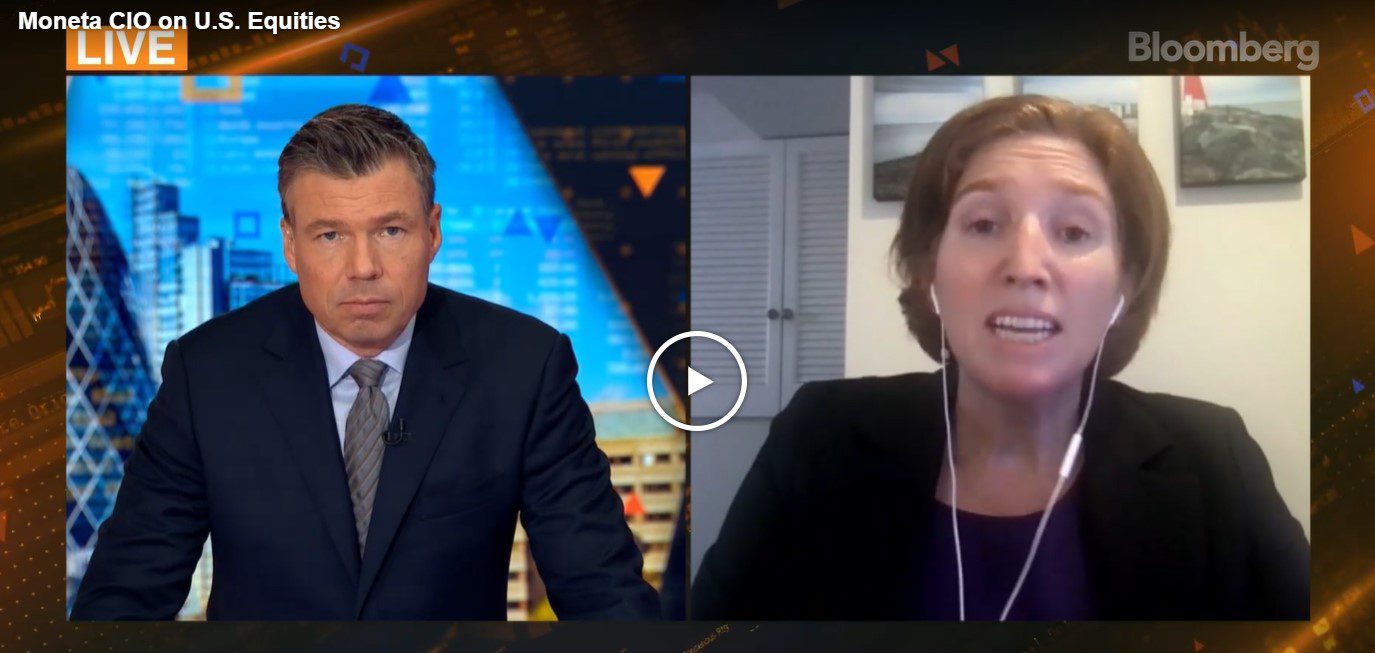Bloomberg interviewed Moneta CIO Aoifinn Devitt about U.S. equities as investors keep an eye on inflation, interest rates and market volatility in the final month of a record year.
Devitt noted the propensity of investors to “buy the dip” because so much money is sitting on the sidelines.
“Flows into equity funds this year were larger than cumulative flows of the last 19 years,” Devitt said. “Clearly we have a large appetite for risk. A lot of money sitting is on the sidelines ready and poised to buy into risk – which it needs to do because of the persistent low interest rates.”
Below is an overview of the questions Bloomberg asked and her responses. You can watch the interview here.
Q: What if we end up with interest rates much higher than anticipated? How do I position for that?
A: That certainly seems like a remote tail risk at this point. We’ve seen a hesitancy from Fed around any tightening of any kind even in face of obvious inflation indicators. Maintain your core allocation to fixed income. It won’t be making much money recently. It’s in portfolio as a ballast, an anchor, a form of deflation hedge. That fixed income will start to come through when interest rates rise. Initially may be a bit of a hit to existing fixed income but ultimately where you’ll want to be. That’s a problem for equities if we see a steepening of yield curve because we’ll see a rotation out of equities to finally some yield in fixed income.
Q: Under what conditions economically could that actually happen?
A: We’d have to see persistently higher inflation, much higher than we’ve already seen. That’s the only trigger I see. I see markets as still being fragile. They are resilient but fragile. They’ve been resilient in the face geo-political news that doesn’t seem to move markets that seem to just want to go in one direction. The fragility is what we see in the demand for bonds. Bond demand hasn’t subsided despite low interest rates, which tells me there is a lot of desire to protect and hedge against a flight to safety.
Q: What is the sensitivity in the bottom end of the credit market to higher interest rates?
A: I don’t think we have a particularly high sensitivity. We’ve seen very low rates in default in credit – unrealistically low rates of default. There probably is a desire and need to normalize that and still for credit portfolios to stand up. The reason for the low rates is because we saw this artificial stimulus and the desire to kick the can down the road and extend, pretend and not force companies to come to reckoning. I don’t see fixed income is going to be that sensitive to changing rates at moment. In the long term, yes, but right now it’s been circling around somewhat unrealistic situation that’s persisted.
Q: Volatility is picking up. How seriously are you taking price moves now and in the next few weeks as we’re living off the Omicron headlines?
A: We’re at the end of a year where records have been set in almost every month. We’ve seen new highs set in the NASDAQ and S&P. So even though this sharp volatility is surprising and sent a chill through markets, we still have a significant bank of equity returns to enjoy. I see there will continue to be some profit taking, but also preparing for 2022. Looking at where portfolio needs to be exposed. Maintaining that core exposure across both the stay-at-home stock as well as the economy reopening stocks. The focus on electric vehicles, renewable energy and the energy transition are themes I think will have a lot of legs as we move into 2022.
©2021, Moneta Group Investment Advisors, LLC. These materials have been prepared for informational purposes only based on materials deemed reliable, but the accuracy of which has not been verified. Past performance is not indicative of future returns. You cannot invest directly in an index. These materials do not constitute an offer or recommendation to buy or sell securities, and do not take into consideration your circumstances, financial or otherwise. You should consult with an appropriately credentialed investment professional before making any investment decision.



